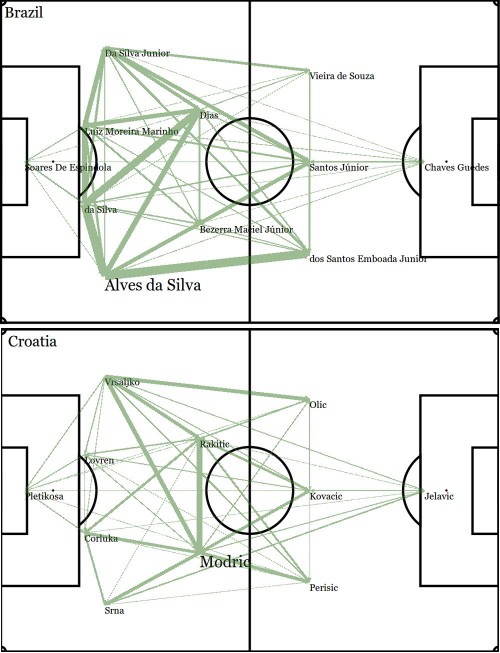Tag archives: networks
A network analysis of the FIFA World Cup
By James Dacey
The FIFA World Cup is under way in Brazil as the national teams from 32 nations battle it out on the pitch for the most prestigious prize in football. It is also an exciting month for football fans across the world as everyone suddenly becomes an expert on the game. Offices, bars and cafes around the world echo with the sound of post-match analysis.
This post-match dissection has now been taken to another level by a pair of computer scientists at the University of Pisa in Italy. At the request of Physics World, Paolo Cintia and Luca Pappalardo have carried out a network analysis of the opening match of the tournament, which saw the hosts Brazil defeat Croatia by three goals to one. Cintia and Pappalardo have viewed the match as if it were an evolving network where players represent nodes that interact by passing the ball to each other along “edges”.
View all posts by this author | View this author's profile
Uncovering the truth in social media

Truth and lies in the web of social media. (Courtesy: Shutterstock)
By James Dacey
“On 27 August…Mars will look as large as the full Moon.”
This was a sentence from a widely circulated e-mail in 2005, in the lead up to one of the closest encounters between Earth and Mars in recorded history.
That our neighbouring planet could appear as prominent as the Moon is, of course, complete claptrap. Since the “Mars hoax” first appeared in 2003, it has re-emerged several times over the past decade.
The Mars hoax is an example of a “meme”, a piece of content or an idea that is spread virally across Internet networks. These days, memes such as this can spread with increasing speed and reach, thanks to the ever-growing expansion of social-media sites such as Facebook and Twitter.
Now, however, researchers at MODUL University Vienna are setting out on the ambitious task of assessing the truthfulness of information that goes viral on social-media sites. The folks behind the project, called PHEME, say that one of their major aims is to acquire an improved understanding of the types of dubious information that are most likely to spread across networks.
View all posts by this author | View this author's profile
